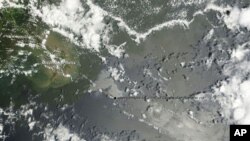U.S. officials say tar balls from the Gulf of Mexico oil leak have been found in Texas, the latest state to be affected by the disaster. Oil also is pushing further into Louisiana, in spite of containment efforts.
The discovery of tar balls along the Texas coast means that every U.S. state on the Gulf of Mexico now has been hit by residue from the oil leak that began on April 20th.
Officials says tests have proven that the leaking oil well produced the tar balls that were found in the waters off the Bolivar Peninsula. However, they say the tests also showed the oil had not been in the water very long.
Coast Guard Admiral Thad Allen said officials are studying whether a ship may have carried the contaminants from the site of the leak.
"The weathering of the oil is not consistent with oil that had made a trip of 400 miles," said Admiral Allen. "Therefore we are looking at five vessels that were at the scene which may have been the way the oil traveled here. However, we are not ruling out any circumstances."
Officials also reported the first signs of oil sheen and tar balls in Lake Ponchartrain, the lake that borders the northern side of the city of New Orleans. Crews were deployed to clean up oily globs and place containment boom along the straits that connect the lake to the Gulf of Mexico.
Officials say heavy storms in recent days may have pushed the oil past barges that were deployed in an effort to stop oil from spreading inland.
During a briefing Tuesday, Admiral Allen also responded to criticism about new rules creating safety areas around containment boom across the Gulf. Some journalists have criticized officials for using the policies to limit access to clean-up sites and hamper coverage of the oil leak.
Admiral Allen said the rules come in response to instances of boaters causing accidental damage or vandalism to the boom.
"What we are trying to do is preserve the boom and the moorings, and create a safe environment not only for the boom to survive itself, but for the boating public that is out there," he said."
Admiral Allen said the supply of boom is running low, as the recovery drags on. He said BP oil company and U.S. officials are looking more and more to international suppliers to provide the boom needed across the Gulf of Mexico.
Texas is Latest State to See Oil from Gulf Leak




